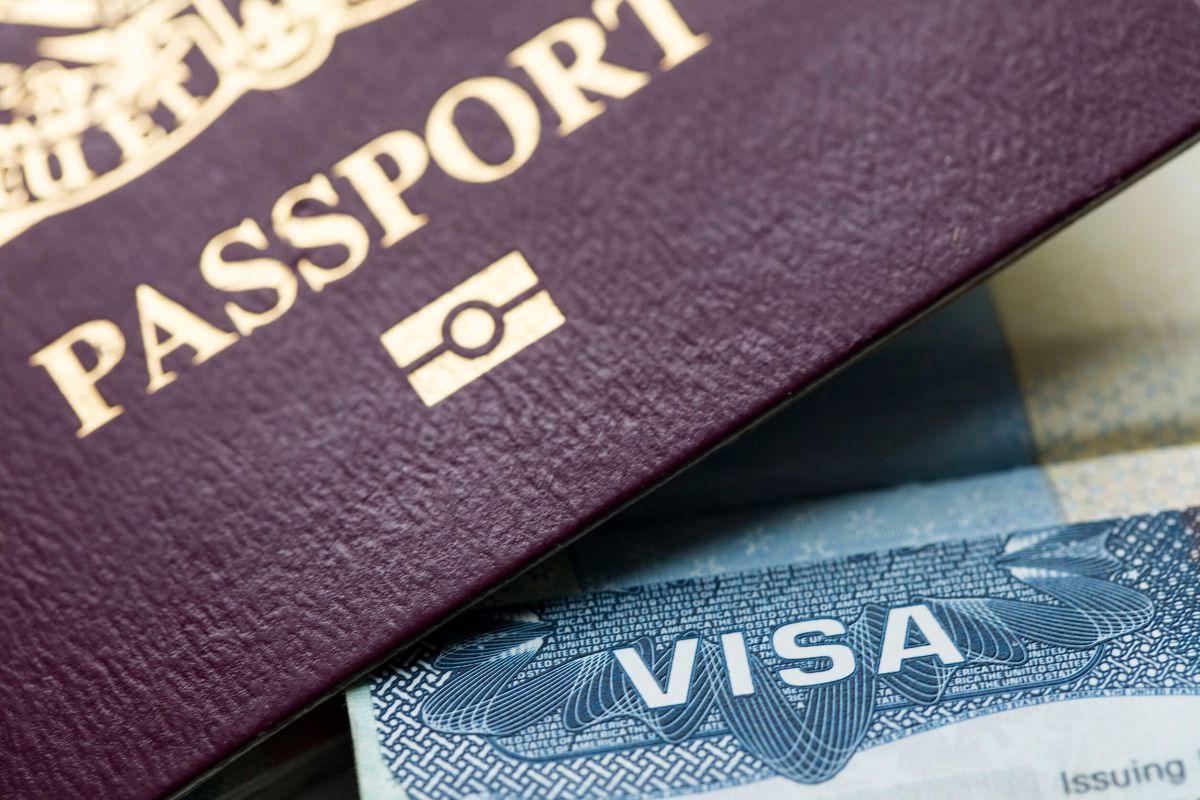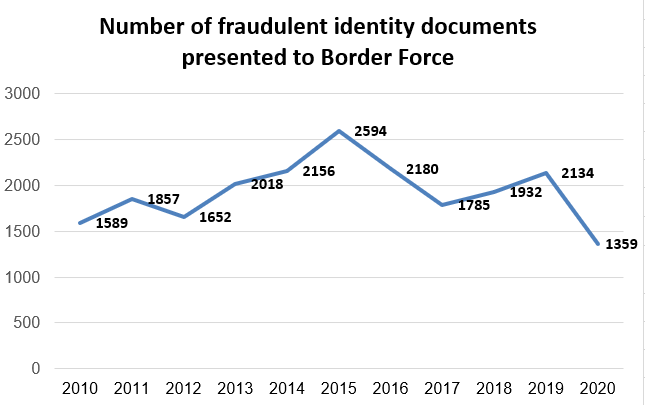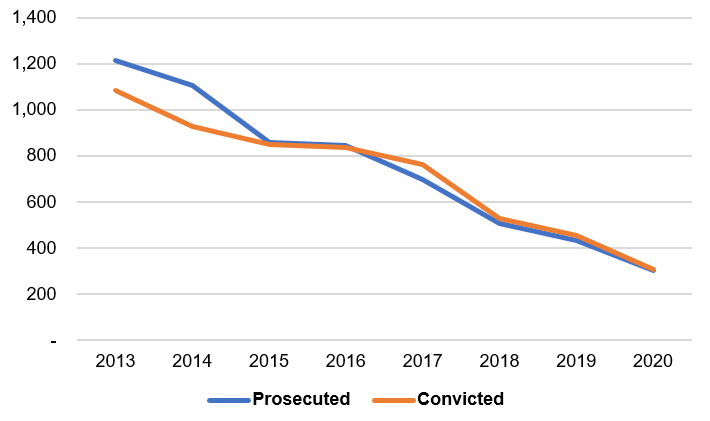
Note: To see the shorter summary of this paper, click here. You can also read coverage of this paper in Metro, Daily Telegraph, The Sun and The Times.
1. A freedom of information release shows that nearly 2,000 fraudulent identity documents are presented to Border Force staff per year (totaling 21,256 between 2010 and 2020)[i] – see Figure 1 below. The number in 2019 was the 4th highest in the period (after 2014-2016) with 2,134 such documents presented before a drop in the midst of plummeting air arrivals during the pandemic. Recently it was reported that the Liverpool bomber Emad Al Swealmeen, who blew himself up outside a women’s hospital on 14 November 2021, deceived officials during an asylum interview after using a fake Jordanian passport to come here.
Figure 1: Fraudulent identity documents presented to Border Force officials, 2010-20

2. According to Home Office (HO) guidance, a “False Document” is defined in paragraph 6 of the Immigration Rules as including any of the following:
- a document which has been altered or tampered with
- a counterfeit document
- a document which is being used by an imposter
- a document which has been fraudulently obtained or issued
- a document which contains a falsified or counterfeit entry clearance, visa or endorsement
3. In most cases where a passenger is suspected of having used a false document or having destroyed a travel document, Border Force has discretion to deal with the individual by seeking to remove them rather than referring the case for potential criminal investigation (Independent Chief Inspector of Borders report). Those found to be using false documents may be prosecuted under the Identity Documents Act 2010, or other provisions. Section 6 of the 2010 Act applies to possession of false documents etc., without reasonable excuse (maximum sentence of two years in prison). Section 4 deals with possession of false documents with improper intention. There is a maximum prison sentence of 10 years. Figure 2 below shows the number of prosecutions and convictions per year (2013-20) for possession of false documents (both indictable only and triable either way).
Figure 2: Prosecutions / convictions; possession of false documents (Min. of Justice).

4. “Passports and other forms of ID are becoming increasingly difficult to forge thanks to state-of-the-art security features such as complex laser perforations or microchips with photos and fingerprints” (according to the EU’s border force Frontex). “But criminals never stop improving their game. New methods include obtaining authentic travel documents under false pretences, using such documents as fake birth or marriage certificates to obtain real documents or using authentic documents of look-alikes.”
5. The Covid period has been a period of much added pressure for Border Force officials, including extra concerns about false documentation connected with travel restrictions and quarantine, with one officer saying: “We’ve been clobbered with a huge increase in workload. It puts immigration control at risk.” (see media report).
6. An Albanian man who used false documents to enter the UK illegally from Ireland used the bogus papers to set up a construction company that allowed him to earn £4,000 a month. He used a range of false passports, driving licences and identity cards in different nationalities for more than seven years before being arrested. He was jailed for 32 months in July 2021 (see media report). In another recent case, a Ghana-born man was jailed for four years, nine months for providing false documents in Sheffield to enable illegal immigrants to remain here (see media report).
7. From 1 October 2021, UK Border Force stopped accepting insecure ID cards from most EU, EEA and Swiss citizens, noting that ID cards are some of the most abused documents seen by Border Force officers. In 2020, almost half of all false documents detected at the border were EU, EEA or Swiss ID cards. “They can be easily abused by people attempting to come into the country illegally” noted the government (see HO press statement).
8. However, both the Independent Chief Inspector of Borders and the Channel Threat Commander have said that those coming here without prior permission often destroy documentation prior to arrival. This poses a huge public safety risk since it makes it much harder to properly identify people for security purposes. Despite not having documentation, most irregular arrivals are then swiftly bailed to live in the community and, due to rapidly collapsing immigration enforcement, will likely be able to remain here even if their asylum claim fails.
9. We recently revealed that asylum age fraud (abetted by this destruction of documentation) has tripled in the year to September 2021 to the highest level since 2006. At least 40,000 people have come by dinghy without prior permission since the start of 2018. Many, if not most, arrivals destroy their documentation before arrival (see our briefing paper).
10. Section 2 of the Asylum and Immigration (Treatment of Claimants) Act 2004 means someone can be prosecuted if claiming asylum having destroyed documents, but prosecutions have fallen dramatically in recent years. The authorities, it seems, are increasingly unwilling to use laws that are already in place to secure the border and keep the public safe.
11. It is also notable that HO asylum guidance suggests falsehoods told by an asylum applicant will not necessarily reflect badly on their claim. The 2015 guidance says: “A claimant’s testimony may include lies or exaggerations for a variety of reasons, not all of which need reflect adversely on other areas… Falsehoods… do not mean that everything the claimant has said must be dismissed as unreliable.” (See HO Asylum policy instruction).
12. It should be added that materially fraudulent asylum claims made, for example, in a false identity or nationality, could render the claimant to prosecution under Section 24A of the Immigration Act 1971 (use of deception to obtain or seek to obtain leave to enter or remain or to secure avoidance, postponement or revocation of enforcement action). However, a study of Ministry of Justice prosecution statistics suggests that this provision is barely being used.
[i] Freedom of Information response by Border Force, 16 November 2021.
